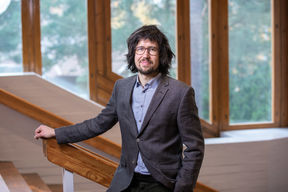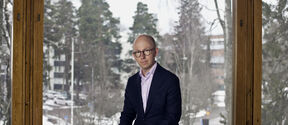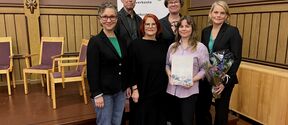Matti Kummu explores possibilities for a future sustainable for both man and nature

Kummu works in the Water and Environmental Engineering research group at the Department of Built Environment. His main research topic is to explore and understand the interactions between humans and natural resources on a global perspective.
Congratulations on making the list! In which field you are a pioneer?
Thank you! I would not say that I am a pioneer in any particular field, but rather that I combine different fields. I was actually listed as a 'cross-field' researcher, which means that my highly-cited articles relate to more than one research field the Web of Science database. Roughly one third of the listed researchers were listed between the fields.
This reflects my research quite well, as it covers multiple topics related on how humans and nature are interacting with each other. My specific aim is to explore the opportunities towards more sustainable ways of using finite natural resources such as land, water and nutrients, particularly for global food production.
Although my topics vary quite broadly, they often connect in ways that even I myself cannot always foresee. This shows that everything is so interlinked that it is important to work with a broad scope in order to understand all the potential connections.
How is it possible for you work with such a wide range of topics?
We take advantage of the rapidly growing availability of openly available spatial global datasets of various issues, ranging from climate to socio-economics. This 'spatial data revolution' has enabled many of our studies. We ourselves promote open access to information by creating open global datasets on a variety of issues.
Further, I am extremely interested in understanding changes over time, as this way we can understand better how we ended up to where we are now. Our team has been part of creating, for example, global historical irrigation maps from the last century and global gridded GDP maps over the past three decades.
The open sharing of information has and will create lots of new research opportunities and it also increases the impact of the research. We are also making a sizable effort towards opening the source code to our analyses, so that others can easily repeat our analyses and develop them further.
And from where do you get the inspiration for your research?
Putting it shortly: exploring and explaining the different phenomena in the world. It is always an amazing feeling to find something new that no-one else has ever researched or analysed. My passion lies in global spatial analysis of the above-mentioned topics, and being able to map and illustrate these novel findings in a beautiful and meaningful way to others. I am also truly inspired of working with and learning from our amazing graduates and degree students.
What motivates you?
Working with issues that have potential impact towards a more sustainable world. I am also very motivated to share my knowledge and thoughts with others. Further, the collaboration with various brilliant people in Aalto as well as internationally is one of my key motivators. I have been very lucky to have opportunities to collaborate with some of the best scholars in the disciplines I work in, and learning a lot about science and life from them.
And finally, can you tell us what goes into preparing a highly cited article?
I don’t think there’s a set recipe for making highly cited articles. However, I think they contain at least the following ingredients:
-
Interdisciplinary team and wide international collaboration.
-
Truly novel results and/or methods on a topic that has high impact in its field and even beyond.
-
Well-written text and very high-quality graphs and maps are especially important to me. They help the wider audience understand and utilise the findings as well as understand how the study in question was conducted.
-
Publishing in high-quality scientific journals, preferably gold open-access ones
-
Promoting the article through, for example, press-releases, Twitter and research portals.
Clarivate Analytics Highly Cited Researchers 2021 listing
The list recognises pioneers in their fields over the past decade. Researchers in the list, approximately 6 600 globally – roughly 20 of which from Finland – have had multiple highly cited papers that rank in the top one per cent of the number of citations in their field in the Web of Science citation database during the last ten years.
https://clarivate.com/webofsciencegroup/researcher-recognition/
Read more news

Environmental Structure of the Year 2025 Award goes to Kalasatama-Pasila tramway
The award is given in recognition of meritorious design and implementation of the built environment. Experts from Aalto University developed sustainability solutions for the project.Landscape architect Sara Korkeamäki received the Lappset scholarship
In her thesis, Korkeamäki examines the multidimensional challenge of biodiversity loss and seeks solutions to it through landscape architecture.
Professor of Ownership Samuli Knüpfer received the OP Financial Group Research Foundation's recognition award
OP Financial Group Research Foundation may award individuals who have significantly promoted economic research in fields supported by the foundation






